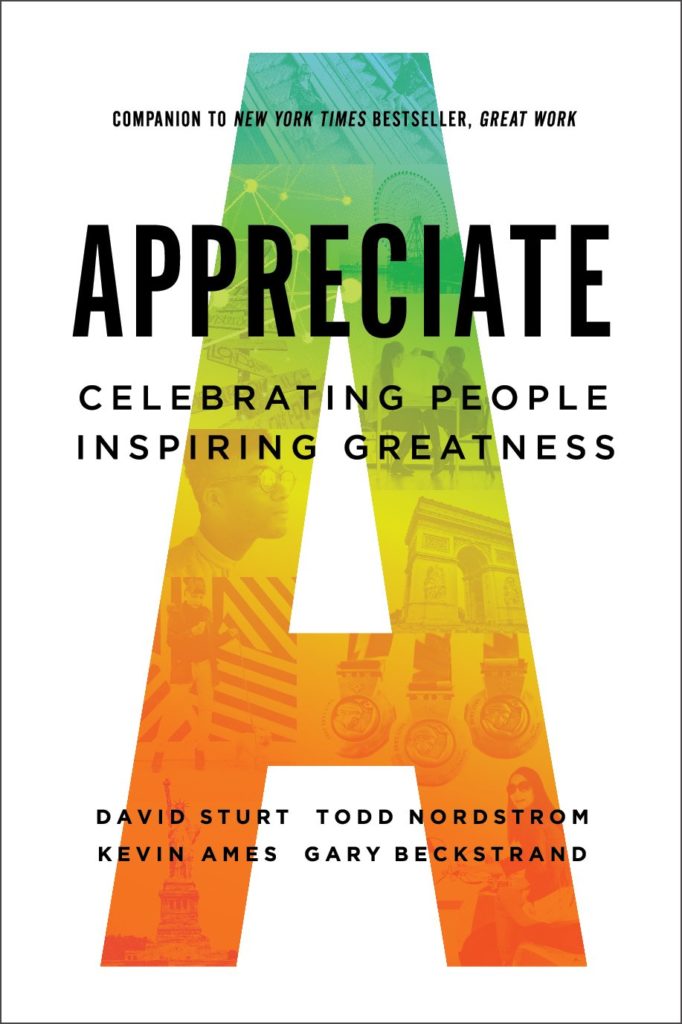My line manager came into my office last week to thank me. Just one sentence: “Thank you, Valerie, for the wonderful work you do.” I broke into a broad smile, full of pride. In that moment, I’m sure I stood a few inches taller!
A week after my boss voiced her appreciation, I’m still feeling the benefits. My motivation has soared, I’m more willing to be creative, even if it means the occasional failure, and I’m more productive.
You’ve likely experienced the powerful emotional and physical impact of appreciation yourself at some point.
Celebrating People

“Appreciate” (written by David Sturt, Todd Nordstrom, Kevin Ames, and Gary Beckstrand) aims to prove to leaders that showing appreciation is one of the most important things they can do.
With 30 years’ experience as an educator, I know that appreciating someone’s unique skills through a word or action can trigger a plethora of positive behaviors, and can even change lives.
People have told me that the appreciation I showed for their unique qualities helped them to achieve their dreams. Often, they can cite my exact words or actions.
So, I’m in total agreement with the authors of “Appreciate,” whose research has shown that, even though financial rewards are fantastic, what people really want is recognition for their unique contributions.
Voice Your Appreciation
One of my first jobs was in a prestigious London university. I worked conscientiously, often far beyond my contracted hours, with no word of validation or thanks.
I felt invisible, and increasingly low. Inevitably, I found another job. At my farewell party, I was finally made aware of how much my unique skills were appreciated. My colleagues had even bought me a gift they knew I’d love – a beautiful leather satchel. Sadly, it was too late.
The authors of “Appreciate” make it very clear that you can appreciate the value of an individual, but it’s also crucial to recognize their value in your words or actions. Communication is key – just one word could inspire someone to greatness.
A spoken “thank you,” or a note or small material reward for effort (or even just for meeting expectations) is all it takes to show appreciation. It’s simply a matter of knowing the individual and making your appreciation known.
Cheer the Effort, Not the Result
A light bulb illuminated in my brain when I read the chapter, “Encourage Effort.”
When you applaud hard work, rather than results, you’re encouraging people to persevere. I find this particularly relevant in my own work. I often pitch ideas for articles, and my self-esteem would be pretty shaky if I only rewarded myself for success.
So I make a point of including a “well done for trying” section in my daily journal. This helps me to feel good about myself and boost my resilience. I have no control over outcomes, only the effort I put in.
Renowned psychologist Carol Dweck also discusses this insight in her influential 2007 book, “Mindset.” She describes how praising people’s results only proves to them that trying is irrelevant. But when you praise people’s efforts, it encourages a dedication to learning, trying and doing.
The Ripple Effect of Appreciation
People who receive appreciation are more efficient, happy and motivated. However, in “Appreciate,” I learned that showing appreciation also affects the giver, as well as everyone who witnesses the appreciation.
The message comes across loud and clear: we’re aware of your unique skills and we value your contribution. Showing appreciation creates a culture of collaboration and care.
In my experience, appreciation is at the heart of all good relationships. As the authors succinctly put it on the first page, “There is nothing louder than the silence where thanks should be.” It’s a no-brainer. Appreciating those around us is one thing we can all do to make everyone happier, more creative, and more productive.
Download the “Appreciate” Book Insight
We review the best new business books and the tested classics in our monthly Book Insights, available in text or as 15-minute audio downloads.
So, if you’re a Mind Tools premium club member or corporate user, download or stream the “Appreciate” Book Insight review now.
Or, if you’re not already signed up, join the Mind Tools Club and gain access to our 2,400+ resources, including 390+ Book Insights. For corporate membership, book a demo with one of our team.
How do you show your appreciation at work, and what impact does it have? Share your experiences in the Comments section, below.




Comments
T says
4 years agoGiving thanks goes a long way
Midgie Thompson says
4 years agoSo true T that saying thank you goes a long way. For me, it acknowledges the other person for what they are doing and makes for pleasant interactions in the future.
Valerie French says
4 years agoI'd always believed that praise motivates more than criticism but reading "Appreciate" brought home to me the power of a personal 'thank you.' I totally agree that giving thanks has a ripple effect making life and work flow more smoothly.
Midgie Thompson says
4 years agoI'm with you Valerie that giving thanks has that positive ripply effect. It acknowledges the other person and it acknowledges what they have done that impacts on your life be that a work colleague or someone in a shop, a sincere thank you makes such a difference!
Anthonytus says
3 years agoWhat charming phrase
Andrewoptip says
3 years agoPerhaps, I shall agree with your phrase
Kimberley says
3 years agoI could not resist commenting. Very well written!
Aondo Ngutor says
3 years agoThank you Valerie for this great article.
I've myself been in situations that felt so frustrating, not because results were not coming through, but my efforts seemed unappreciated.
The response was to move aside, when I didn't, deep down I was hurt.
Sarah Harvey says
3 years agoThanks for sharing your comment Aondo. It is such a shame that you were left feeling unappreciated and hurt when all it may have taken was a word of thanks and recognition to feel appreciated.
Sarah
Mind Tools Coach
Valerie French says
3 years agoThank you for your comment Aondo. Appreciation stated clearly and with an example is key to a happy and thriving work environment. I'm sorry you didn't receive the appreciation you deserved.
Victor says
3 years agoDo you mind if I quote a couple of your posts as long as I provide credit and sources back to your site?
My blog site is in the very same niche as yours and my users would really benefit from a lot of the information you provide here.
Please let me know if this alright with you. Regards!
Sonia Harris says
3 years agoHello Victor,
Thanks for visiting our site. I invite you to review our Acceptable Use Policy for using our resources.
~Sonia
Mind Tools Coach